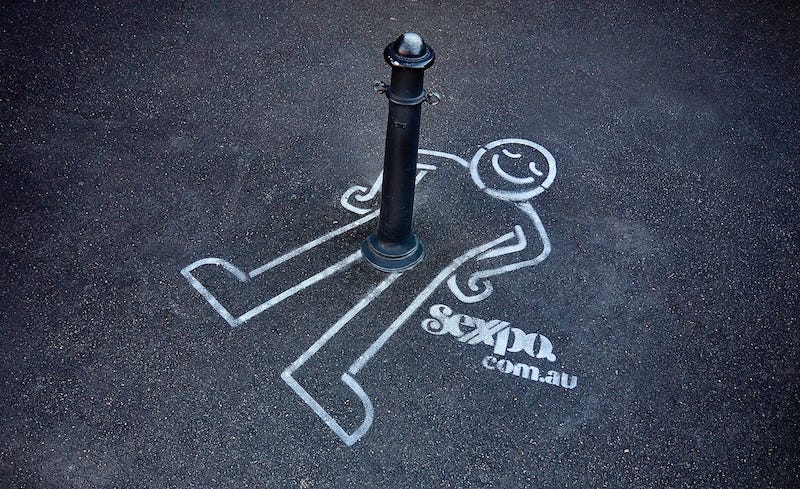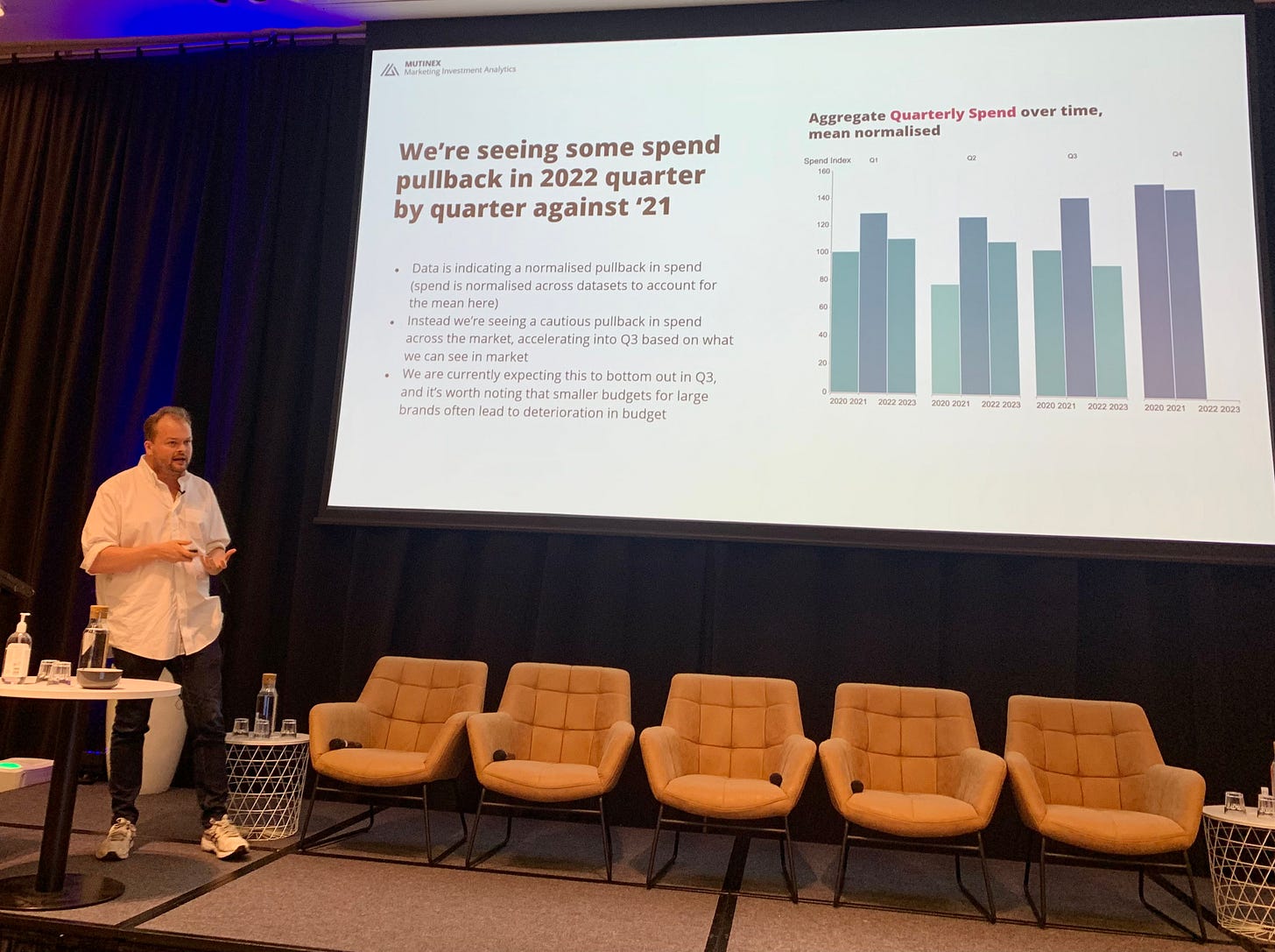BOTW: Anti-social media, Sexpo style; Gravity catches the platforms; Musk reaches out to advertisers
Welcome to Best of the Week, written on an intermittently drizzly Friday afternoon at beautiful Sisters Beach, Tasmania.
Happy Hug a Sheep Day.
Today: Medibank’s brand disaster is starting to look worse than Optus; Twitter gets Musked; Meta falls off a cliff; Amazon hits a wall; Alphabet stalls, and brands making the world a worse place.
Unmade’s paying members get two complimentary tickets to our agenda-setting Marketing in 2023 event. You’ll find details in the ad further down in this email. And at the bottom of this page, below the paywall, you’ll find the discount code you need to access them. Monthly memberships start at $65. And tickets are $69 each - feel free to do the maths.
How to lose social licence
Two years ago - when Unmade was still called Fifth Day and we only had 1,121 subscribers - the first piece I wrote here was about the role the late David Ogilvy played in shaping today’s advertising world.
The greatest adman of all time was no fan of outdoor advertising. His concern was that it amounted to visual pollution. As he made clear in his classic book Ogilvy on Advertising, he hated billboards:
“I cannot believe that the free-enterprise system would be irreparably damaged if they were abolished. Who is in favour of them? Only the people who make money out of them.”
If he was alive today, the 111 year old would despise The Core Agency and guerrilla marketing outfit Street Fighter Media.
Yesterday, Core put out a press release boasting about the work it hired Street Fighter Media to do for client Sexpo. SFM sprayed chalk to turn bollards around Central Station into cartoon characters with giant erections. In case you were wondering, Sexpo is an event for the sex industry, taking place in Sydney this weekend.
Is it a clever creative idea? Yes.
Does it make the world a tackier place? Also yes.
If anybody bothered to complain, it would be an obvious breach of section 2.4 of the Australian Association of National Advertisers’ Code of Ethics, which is administered by industry body Ad Standards: “Advertising or Marketing Communications shall treat sex, sexuality and nudity with sensitivity to the relevant audience.”
In this case, the relevant audience being the families or children who walk past.
Sexpo knows its way around the code of ethics. It has been the subject of 56 previous complaints to Ad Standards, and has lost plenty of them without consequence. Ad Standards is self administered by the marketing industry, and the only power it has is to ask for ads to be taken down. If the client or media owner doesn’t care, then they can ignore the ruling.
Some controversy about the stunt would only serve to deliver Sexpo the publicity it’s looking for. As Core says, knowingly, in its press release, the campaign “will remain up until the event finishes, or some wowser complains…” Otherwise, “the special process they use to spray the stencil onto the pavement means it can stay up for days, if not weeks.”
I wonder whether any of Core’s blue chip clients - including NSW Government, for instance - are wowsers.
No doubt this one will come and go. The cliche of Silicon Valley is that every startup claims its mission is to make the world a better place. In adland, it sometimes seems to be the opposite.
There’s been plenty of coverage in recent days of the QMS rollout of its oversized “communications pylons” onto the streets of Sydney. The backlash to the blocked pavements has reportedly seen some of that rollout paused.
I wondered whether Cathy O’Connor, CEO of Ooh Media, was referring to that when she introduced this week’s Ooh Outfront event: “It’s our purpose as a company to make public spaces better.”
As it happens, we also covered the topic of brand behaviour in Thursday’s podcast exploration of brands doing good, which was based on Leo Burnett research into the topic.
A couple of decades back, the UK authorities wiped out much of the guerrilla marketing industry. They used a new law - allowing the serving of anti-social behaviour orders, or ASBOs, on individuals who had engaged in anti-social behaviour. ASBOs were served on the directors of guerrilla marketing agencies. It meant future repeats would be criminal rather than civil. Fly posting virtually vanished.
In the case of Sexpo, the stunt is bang on brand. Its target audience - who want to see porn stars and Only Fans influencers - wouldn’t care less. The question is whether brands - and the agencies that work for them - have any obligation to the wider industry.
The number of unenforceable edge cases are growing and not just around guerrilla marketing. Much of the influencer industry seems to ignore the code of ethics too.
The advertising industry is fortunate to be inside a self-regulation system rather than something more legally onerous. Every edge case threatens adland’s social licence.
The rise (and fall?) of Meta
It couldn’t have happened to a nicer disinformation platform.
Facebook’s owner Meta, once a trillion-dollar company, is now worth about a quarter of that.
The company has lost 70% of its value this year, including 22% this week alone, thanks to a dreadful set of quarterly financials.
Profits halved for the quarter, in part because of market conditions - in a downtown, marketing spend moves fastest out of digital - and also because of growing competition from the likes of TikTok.
But the company is also down because of the eye-watering amount Mark Zuckerberg is spending on trying to build a place in the metaverse. Zuck insists that he’ll be spending even more in the next quarter.
Although he only owns about 13% of the company, Zuckerberg still controls the voting shares, so he can do exactly what he likes.
He’ll either prove the entire commentariat wrong, or take down the company with his hubris. It’s going to be fun finding out which.
Alphabet and Amazon struggle too
The warnings have been everywhere this week.
Google’s parent company Alphabet, down by 34% for the year to date, slumped further this week. Revenue is flatlining for the same reasons as Meta - worsening economic conditions and the rise of TikTok. YouTube’s advertising revenue actually fell for the first time.
And for a company that doesn’t often get stuff wrong, Amazon also offered bad news this week. It predicts that the current quarter is going to be a tough one.
That poor outlook extends to Australia too. Earlier in the week I popped into the IAB MeasureUp conference in Sydney.
Henry Innis, CEO and cofounder of Mutinex (that’s not a typo - they’ve rebranded from Mutiny to deal with trademark issues in the US) shared data on marketing budget trends his company has been following. “Very real deceleration” was the phrase that stood out for me.
Musk is in the Twitter building
Yesterday, notable asshole Elon Musk became the new proprietor of Twitter, at the expensive price of more than US $40bn.
Within hours, he fired the management team and has been tweeting up a storm ever since. That’s included a message to advertisers promising it won’t be a “free-for-all-hellscape”.
Yet he’s also threatened to unban the likes of Donald Trump. That will be Musk’s biggest challenge. He’s taken over Twitter with a policy of less moderation. Yet advertisers will stay away unless they can have a brand safe environment.
Some of that answer emerged this morning - a content moderation council.

It sounds a lot like Meta’s Oversight Board, which provides Facebook with a policy fig leaf. As Casey Newton recently revealed, that expensively constituted board has only been hearing a tiny handful of cases - just three in the last quarter.
Medibank’s brand disaster
At first, it looked like Medibank was handling the comms around its data breach better than Optus.
Cyber minister Clare O’Neil said nicer things about its transparency and handling than she did about Optus.
Now though, it’s starting to look like an utter disaster.
If you thought driving licence details were bad, just wait until details of people’s most personal medical conditions start hitting the public domain.
Index dips again
The Unmade Index fell for a second day in a row, dropping by 1.28% on Friday.
Out of home company Ooh Media had the worst of it among the big media companies, falling by 3.15%
End of a long week
It’s almost time to let you get on with your Saturday.
If you’re Melbourne based, I’d love to see you at our evening Marketing In 2023 event in a couple of weeks. The code that Unmade’s paying members can use to get two complimentary tickets to our event is beneath the paywall at the bottom of this page.
The weekend has been a particularly long time coming for me. This week’s Sydney travel from Tasmania was more of a chore than usual, thanks to a washed out bridge adding several hours to the round trip.
And you may have seen yesterday’s news that Damian Francis, who partnered with me on launching Unmade, has headed back to a big job at the Mumbrella mothership. That was not part of the plan; I can confirm that it’s more fun being poacher than poachee. Nonetheless, Damo heads back to Walker Street with my thanks. We would not have got to this point without him, and he’ll be missed.
In the coming days, I’ll be writing a job description for our next hire. If you’re a journo who is curious about the uniquely stressful, fun, chaotic and challenging life that a media startup brings, then please do drop me a line to tim@unmade.media.
And such is the pace of startup life, that I can also share news about our next development. Unmade’s advertising offering will be represented by some of the most experienced people in the world of the Australian advertising industry - We Think Media.
Founded by Peter Wiltshire (former sales boss of Nine) and Jane Stucci (former group sales director at SCA), We Think Media is Australia’s best known indie sales house.
If you’d like to chat about the high impact advertising you see Listnr enjoying in today’s newsletter, please drop a line to unmade@wethinkmedia.com.au.
In the meantime, Abe Udy and I will be back on Monday with Start the Week.
Have a great weekend.
Toodlepip…
Tim Burrowes



















